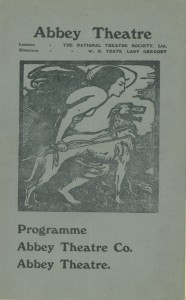Special Collections has recently acquired three books that provide a Reading connection to Ireland’s early 20th-century troubles. The Enemies of the State project, a collaboration between the Department of English Literature at the University of Reading and Berkshire Record Office, ran in 2012 to engage audiences with archives on the internment of Irish patriots in Reading Prison following the 1916 Easter Uprising. These Irish prisoners were listed in the prison’s register under ‘Aliens and Irish’ and joined other foreign nationals held in the prison.
Part of the project included a small display of material related to the prison and prisoners, including three books – two by Terence MacSwiney (Principles of Freedom and The Revolutionist) and one by Darrell Figgis (A Chronicle of Jails). These have now made their way to us here so that they can be available to researchers.
Terence MacSwiney was born on 28 March 1879 in Cork. He cultivated an interest in literature and Irish language and nationalism, founding the Celtic Literary Society, attending Gaelic League classes, setting up the Cork Dramatic Society and contributing to the republican paper Fianna Fáil (‘Soldiers of Destiny’) before its suppression. MacSwiney was a founding member of the Irish Volunteers, and he was arrested in 1916 and sent to Reading Prison. After eventual release he was elected to the Dáil Éireann for Sinn Féin and became Lord Mayor of Cork, but MacSwiney was arrested again in 1920 and died of hunger strike. He was widely mourned, and revolutionaries worldwide have claimed him among their influences.
MacSwiney’s Principles of Freedom (1921), his posthumously published book of essays, sees him explore the difference between ‘propagandist’ literature and ‘art for art’s sake’. MacSwiney’s ideal Irish writer ‘will not be careless of form, but the passion that is in him will make simple words burn and live’. This copy belonged to one of Eithne MacSwiney, Terence’s sister, and includes a pasted insert that translates to, ‘Nothing becomes a person as much as giving his life up for his friends. Pray for all our soldiers – May God free the Republic’.
His The Revolutionist: A Play in Five Acts is a first edition copy that appears to have belonged to and been used by the Abbey Theatre in Dublin. It came with a playbill for the original 1921 production directed by Yeats and Lady Gregory and includes annotations with stage directions and script notes.
 Darrell Figgis was born in Dublin but lived in India until moving to London to continue the family business as a young adult. He worked for the publisher Dent for some time, but moved to Achill Island in 1913, where he became a part of the Irish Revival. Figgis joined the Irish Volunteers and became involved in arms supply to the Volunteers, resulting in his arrest and eventual internment in Reading.
Darrell Figgis was born in Dublin but lived in India until moving to London to continue the family business as a young adult. He worked for the publisher Dent for some time, but moved to Achill Island in 1913, where he became a part of the Irish Revival. Figgis joined the Irish Volunteers and became involved in arms supply to the Volunteers, resulting in his arrest and eventual internment in Reading.
Figgis’s A Chronicle of Jails details his time spent in the prison in Reading. He talks about the prison (‘the gaol is a handsome building, erected in red brick after the manner of an old castle’) and his conditions; Figgis learned what he could about law in order to lobby for better prison conditions.
Figgis went on to play a prominent part of Irish politics up to the 1920s, but committed suicide in 1925.


